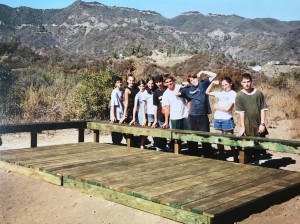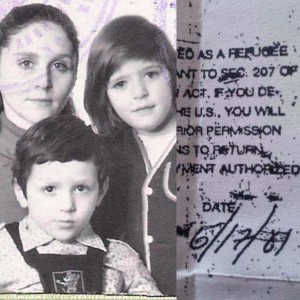
by admin
My Jewish Summer Camp Was Destroyed in the Woolsey Fires—But We Vow to Rebuild
 Last month, I heard the news: Camp JCA Shalom, the summer camp I attended for many years as a child, was almost entirely destroyed in the Woolsey fire that ravaged parts of Los Angeles County.
Last month, I heard the news: Camp JCA Shalom, the summer camp I attended for many years as a child, was almost entirely destroyed in the Woolsey fire that ravaged parts of Los Angeles County.
And just a few weeks earlier, I woke up to several text messages offering me condolences, full of well wishes and broken heart emojis. I checked the news to discover that a man shouting “all Jews must die” had murdered eleven people and injured seven others during Shabbat services at a Pittsburgh synagogue.
As the child of Jewish refugees, these tragedies hit close to home — and are compounded in my gut. Camp JCA Shalom taught me Jewish traditions and rituals that my family never knew because they weren’t able to openly practice Judaism in the Soviet Union. And I cannot ignore that the Pittsburgh shooter had posted hate speech targeting refugees, specifically naming the organization that funded and supported my own family in their emigration.
My mother, father, and two of my much-older siblings fled the Soviet Union in 1981. HIAS, a global Jewish organization supporting refugee resettlement, paid for their flights out — first to Rome where they waited for American visas, and then to the U.S. Once they landed, a Jewish nonprofit in Orange County, California paid their rent for two months on an apartment which was fully stocked with donated furniture, towels, appliances, toothpaste, and cookware. I still own a faded yellow hand mixer gifted to my family, and I treasure it even though it smells oddly like burning rubber when I turn it on. It’s a symbol of the generosity HIAS and others showed to families like mine.
 Robert Bowers, the white nationalist behind the Pittsburgh massacre, appears to have been motivated by the HIAS-sponsored National Refugee Shabbat, which took place one week before his killings. On social media, Bowers wrote: “HIAS likes to bring invaders in that kill our people. I can’t sit by and watch my people get slaughtered.”
Robert Bowers, the white nationalist behind the Pittsburgh massacre, appears to have been motivated by the HIAS-sponsored National Refugee Shabbat, which took place one week before his killings. On social media, Bowers wrote: “HIAS likes to bring invaders in that kill our people. I can’t sit by and watch my people get slaughtered.”
I am the child of these “invaders”: five years after my family’s arrival, I was born. It’s no exaggeration to say that activism for and by refugees has literally enabled my life in this country, where I experience more religious and political freedom than my family ever did.
My mother didn’t know many Jewish traditions to pass on to me, but through Camp JCA Shalom, I got to be the Jew she never got to be. A camp director approached my artist mother in 1991 to paint a large-scale mural at the Malibu site, and while he couldn’t pay her, he offered to let me attend camp, otherwise financially out of reach, for free.
And so I spent a week or two almost every summer from 1991 to 2000 on a dusty hilltop surrounded by the smell of eucalyptus trees, doing archery, swimming, and rock climbing. More importantly, perhaps, I learned the post-meal prayer called Birkat Hamazon, and pounded my hands on the huge cafeteria tables during the nightly song, generating a resounding bass with the rest of camp and taking part in Jewish rituals that had been denied to my family. When I was fourteen years old, I participated in a service week at camp, which focused on developing leadership skills through a collaborative community service project. That year, we built an observation deck together, a simple wooden platform with a bench for stargazing, a gift we dedicated to camp for all time. We loved that place.
While all staff, torahs, and farm animals were safely evacuated, we now know that the Woolsey fire destroyed 95% of camp’s buildings, nearly leveling the dining hall and amphitheater where I learned and sang songs. The only things which survived the fire are “parts of The Emma Stern Center [motel-style housing], a few plaques, signs, and memorabilia and miraculously six of the beehives,” says a note on the camp’s website. (Other Jewish institutions have also suffered greatly.) I can only assume our observation deck has been consumed in the flames. My mother’s faded mural is partly visible in a photograph of the burned down swimming facilities.
It is difficult to bear. But our people’s resilience and resourcefulness is astounding. As the fires still raged, 500 camp supporters gathered to celebrate and grieve. I watched from Washington, DC via livestream, singing along to familiar songs I haven’t sung in almost two decades.
Camp JCA Shalom is already securing temporary locations for their upcoming camps as formal and informal fundraisers keep springing up. And as HIAS recently wrote, multiple refugee candidates, and candidates whose families came to the United States as refugees, won in the recent election — just over a week after the Pittsburgh shooting.
In this climate of rising hate crimes, anti-Muslim and anti-Semitic campaign rhetoric, and official efforts by the Trump Administration to prohibit refugees from entering this country, I remind myself of who I am and where I came from. I will speak up for refugees at every turn, and from Pittsburgh to Malibu, I know Jews will rebuild.
Tanya Paperny is a writer, editor, ‘zine maker, and educator in Washington, D.C. Her work has appeared in The Atlantic, The Washington Post, Washington City Paper, The Literary Review, Beltway Poetry Quarterly, Pacific Standard, and elsewhere. More information is on her website.
